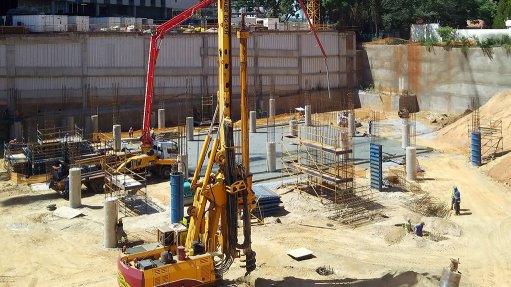
Concor Buildings has kicked off construction on the second phase of the prestigious Oxford Parks project in Rosebank, Johannesburg, after their successful completion of the first phase last year.
The Phase 2 project comprises two office buildings, and construction began in February 2019. Each block is designed to achieve a four-star rating as certified by the Green Building Council South Africa’s Green Star system, reflecting a ‘best practice’ level. This includes energy efficient design, and the use of selected materials such as reduced-cement concrete.
The first block – section one of the Phase 2 project – will have three office levels of just over 2,800 m2 gross building area (GBA), built on four basement levels measuring about 11,000 m2. There will also be a retail component on the ground floor of almost 950 m2 GBA. The gross leasable area (GLA) of the office levels will amount to over 2,500 m2, while in the retail area it will be about 670 m2. This building is scheduled for completion in January 2020.
In section two, which is expected to be completed in September 2020, the building will comprise five office levels and four basement levels. Office space will measure about 8,750 m2 GLA and almost 9,700 m2 GBA, while the basement area measures 12,440 m2. It will also include a ground floor retail component, this one measuring 1,047 m2 GLA and 1,177 m2 GBA.
According to Concor Buildings contract manager Chris Maritz – who also oversaw Oxford Parks Phase 1 – difficult trading conditions continue to be experienced in Gauteng’s private sector construction segment. This makes for tight margins, also demanding that close control be constantly exerted on site to ensure all the necessary process as well as quality and safety systems are applied.
“The project deadlines will, as usual, be challenging to meet, especially with the heavy rain experienced in the month of February 2019,” says Maritz. “The ground and foundation work are particularly weather‑sensitive, and the heavy rain has a direct impact on site progress.”
He notes that the foundation conditions on site are not ideal, with varying rock levels resulting in a mix of pile caps and foundations being employed. While pile caps are used where load bearing piles can be installed, the foundations are required where excavations for bases need to reach bedrock, resulting in deep excavations that require substantial mass concrete.
“All these factors add further constraints on the project schedule, but of course the extensive experience in our teams equip us well to deal with the challenges as they arise,” Maritz says. “A crucial part of managing a project to successful completion is also the appointment of quality selected sub-contractors. Our broad network and experience of the best service providers is therefore a valuable asset in a fast track project like this.”
Maritz highlights that a vital factor in maintaining the pace of a project is the ability to foresee potentially time consuming delays.
“An important consideration is always compliance to South African National Standards (SANS) specifications,” he says. “There are even relatively minor issues that can have significant impact on the schedule. We are therefore slightly up-sizing the fire escapes, for instance, to make sure our final result is always well within spec.”
Stairs for fire escapes will also be completed ‘off-shutter’ to reduce the time and resources associated with final granolithic treads and risers. The use of unitised panels for the buildings’ façades will also reduce the need for façade scaffolding, as these units can be installed from the inside.
Another innovation on the project will be to install the reinforcing of basement columns to a height that spans two levels at a time. This allows a more efficient process of shuttering and pouring columns, that will further contribute to the pace of the project.